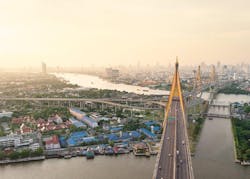Note to Manufacturers --Thailand Wants Your Business
For companies caught in the ever-shifting sands of the global trade war, deciding where to locate is extremely difficult.
Wanting to make the decision easier, Thailand recently created a package of incentives that allows foreign companies to quickly set up facilities in the country.
And they mean quick. It takes only four and a half days to set up a business with the country’s efficient system, including a One Start One Stop Investment Center.
This system has been honed over many years of working with manufacturing companies. In fact, Thailand holds the top spot in the ASEAN (Association of Southeast Asian Nations) market for producing auto parts. Global auto companies have set up extensive supply chains which include 18 car manufacturers, 476 Tier one suppliers and 1,700 Tier 2 and 3 suppliers.
And the electronic sector is well established as well, ranking third in the export of electrical and electronic categories n the ASEAN market. In this sector, which Thailand refers to as Smart Electronics, there are 666 companies manufacturing electrical parts, 561 that make electronics and 431 electrical companies.
These sectors and others are supported by many international companies including Western Digital, Seagate, Toshiba, Canon, Sharp and Philips. Most are located in industrial states. of which there are 57 in 16 provinces or at 25 industrial zone parks located in 10 provinces.
Trade War Creating Opportunities
Thailand sees the current economic uncertainty as an ideal opportunity to both build up its current manufacturing base, but probably more important to make strategic investments toward future sectors. To do this in September Thailand announced an incentive package.
“Our ‘Thailand Plus’ package covers a wide range of incentives to attract strategic investment projects to Thailand,“ said Ms. Duangjai Asawachintachit, the Secretary General of the Thailand Board of Investment. “While our tax incentives are a key element, the incentives are across the board including workforce and productivity incentives.”
To qualify for these incentives, projects must be worth at least 1 billion baht (US$32.26 million) and need to be submitted to the Board of Investment by 2020. The project will receive an additional 5 years of 50% reduction of corporate income tax given that at least that investment is put in place by Dec. 2021.
Targeted Investment
This new package builds on the already successful incentives that the country has used to attract foreign direct investment (FDI). In 2018, total FDI into Thailand was $227 billion.
As it continues to attract foreign investment, Thailand has an underlying strategy. “As technology continues to transform manufacturing, we welcome projects that invest in automation and upon approval of the project would provide fiscal incentives,” said Asawachintachit.
Projects that will move to the top of the approval list include replacing or upgrading machinery for efficiency enhancement including automation or digitalization. Other preferred projects include replacing or upgrading machinery for energy conservation, alternative energy utilization and reducing environmental impact. Research and development projects that include advanced engineered are of great interest to this country of 69 million people.
One sector that is particularly desirable is aerospace. “As the aerospace industry grows, we would especially like to encourage U.S. investment in Thailand in this sector," said Asawachintachit. "The U.S. is one of our largest investors and has been over many decades.”
To further increase U.S. investment, as well as investment from other countries, Thailand touts its advantage of being a regional economic hub. Within 1000 kilometers there are 242 million people in the CLMVT region which includes Cambodia, Laos, Myanmar, Vietnam, Thailand. A little further out at 3,000 kilometers the ASEAN market measures 645 million. And if you look at Asia as a whole there are 4.6 billion consumers. To facilitate the ease of doing business across the region Thailand has 13 free trade agreements. Additionally, trade is almost tariff-free with 18 countries.
“One of our strengths is our strategic location," said Asawachintachit. "While we are smaller than China, we are a very large market.”
Workforce Incentives
Understanding the importance of a skilled workforce when deciding where to locate a facility, the new incentive package includes assistance to investors in training the workforce. While Thailand currently has approximately 1.8 million students in higher education, the country recognizes that continual training is necessary. So employers will be eligible for a special deduction of training expenses related to advanced technology. This incentive is endorsed by the Ministry of Higher Education, Science, Research and Innovation in order to expedite reskilling and upskilling of the workforce. Expenses spent hiring skilled manpower, in fields of science and technology will also be entitled to a special deduction.
Long-Term Perspective
As a nation that has planned out its economic growth, with regard to its manufacturing sector, top leadership is very involved. “The importance of these new investments is demonstrated by the fact that our Prime Minister will chair an investment committee that will review proposed projects, especially the larger projects,” said Asawachintachit.
Perhaps strong leadership is one of the reasons that investment in Thailand continues to be strong. Since January of this year, 155 foreign companies have been granted licenses to conduct business in Thailand, generating more than 21 billion baht (US $695).
Even with this growth, Thailand isn't content to rest on its laurels. “We always look at the long term and realize that in order to retain Thailand’s preferred status we need to constantly improve our ecosystem.”

